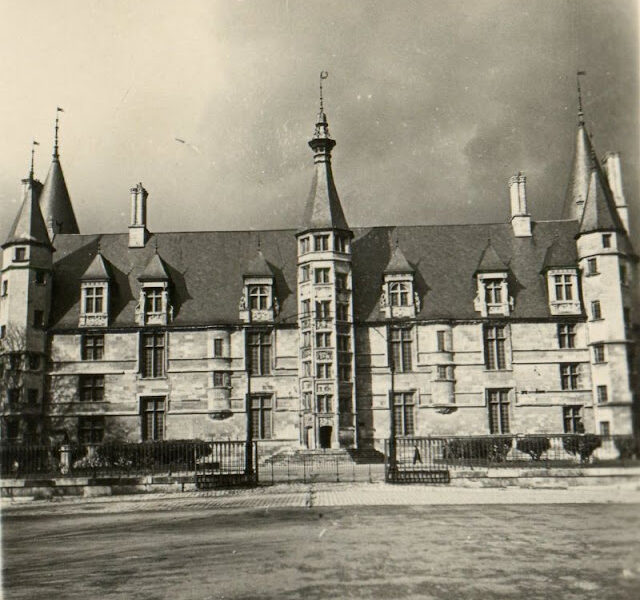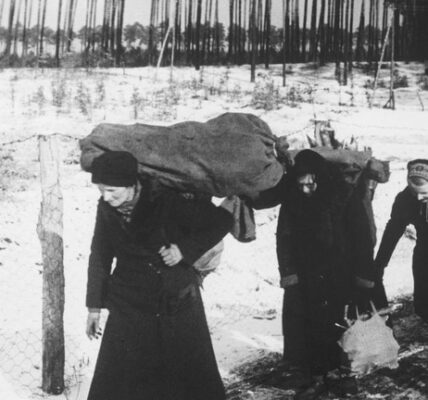In 1940, France was invaded and quickly defeated by Nazi Germany. France was divided into a German occupation zone in the north, an Italian occupation zone in the southeast and an unoccupied territory, the rest of France, which consisted of the southern French metropolitan territory (two-fifths of pre-war metropolitan France) and the French empire, which included the two protectorates of French Tunisia and French Morocco, and French Algeria; the Vichy government, a newly established authoritarian regime collaborating with Germany, ruled the unoccupied territory. Free France, the government-in-exile led by Charles de Gaulle, was set up in London.
 |
| France in the 1940s |
From 1942 to 1944, about 160,000 French citizens, including around 75,000 Jews, were deported to death camps and concentration camps in Germany and occupied Poland. In September 1943, Corsica was the first French metropolitan territory to liberate itself from the Axis. On 6 June 1944, the Allies invaded Normandy and in August they invaded Provence.
Over the following year the Allies and the French Resistance emerged victorious over the Axis powers and French sovereignty was restored with the establishment of the Provisional Government of the French Republic (GPRF). This interim government, established by de Gaulle, aimed to continue to wage war against Germany and to purge collaborators from office. It also made several important reforms (suffrage extended to women, creation of a social security system).
These vintage photos from Kai Heinrich were taken by a German soldier that show street scenes of France in the 1940s.
 |
| Cabourg, France in the 1940s |
 |
| Cathédrale Saint-Cyr et Sainte-Julitte de Nevers, France in the 1940s |
 |
| Cathédrale Saint-Cyr et Sainte-Julitte de Nevers, France in the 1940s |
 |
| Cathédrale Saint-Cyr et Sainte-Julitte de Nevers, France in the 1940s |
 |
| Chapelle des Carmélites de Dijon, France, circa 1940s |
 |
| Chapelle Sainte-Marie, Nevers, France in the 1940s |
 |
| Cour de Bar, Dijon, France, circa 1940s |
 |
| Dijon, France, circa 1940s |
 |
| Église Notre-Dame de Dijon, France, winter 1940s |
 |
| Évreux, France in the 1940s |
 |
| Hôtel de Ville, Paris, circa 1940s |
 |
| La chapelle Sainte-Marie, Nevers, France in the 1940s |
 |
| Le quai de Mantoue in Nevers, France in the 1940s |
 |
| Maison Maillard, Dijon, France, circa 1940s |
 |
| Palace of Versailles, Paris, circa 1940s |
 |
| Palais des ducs de Bourgogne (Dukes of Burgundy’s Palace), Dijon, Côte-d’Or departement, Burgundy, France, circa 1940s |
 |
| Palais ducal de Nevers, France in the 1940s |
 |
| Pont ferroviaire de Nevers, France in the 1940s |
 |
| Pont ferroviaire de Nevers, France in the 1940s |
 |
| Rue de calvaire, Nevers, France in the 1940s |
 |
| Rue du Palais Dijon, France in the 1940s |
 |
| Seine-bridge, Paris in the 1940s |
 |
| Somewhere in France in the 1940s |
 |
| Somewhere in France in the 1940s |
 |
| Somewhere in France in the 1940s |
 |
| Somewhere in France in the 1940s |
 |
| Somewhere in France in the 1940s |
 |
| St. Philibert, Dijon, France, circa 1940s |
 |
| St. Philibert, Dijon, France, circa 1940s |
 |
| Statue of Clemenceau at the Petit Palais, Place Clemenceau, Paris, circa 1940s |
 |
| Statue of François-Jean Lefebvre de La Barre in the Square Nadar, in front of the Basilique du Sacre Coeur in Montmartre, Paris, circa 1940s |
 |
| This fountain stands in Nevers, France in the 1940s |
 |
| Unknown place in France in the 1940s |
 |
| Unknown place in France in the 1940s |
 |
| Unknown place in France in the 1940s |


